Aug
11
STAYING OUT OF THE SAD SACK
Filed Under Combat PTSD, Family, Healing Waters, Peace, Pets, PTSD treatment, Tears of a Warrior, War | Comments Off on STAYING OUT OF THE SAD SACK
by Janet J. Seahorn
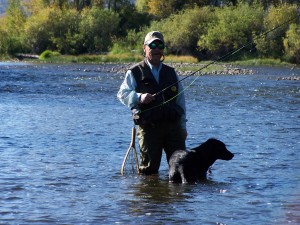
A few weeks ago we had the rare opportunity for my family to get together and spend some quality time floating, fishing, and just chilling out in Wyoming.
During one of our chats, my brother, a Vietnam Navy vet, started talking about how hard it is to stay out of the “Sad Sack”, especially when his PTSD starts rearing it’s nasty head.
Although it is not realistic to expect that any of us can totally avoid jumping into this particular “sack”, it is wise to try and do something more inspiring than hanging out in the land of gloom.
Go for a walk, listen to music, write, or take up pottery or painting… or fishing. Anything that can help take your mind off of the misery.
One Vietnam vet I recently heard from talked about some of the projects he has done and continues to do for the children in Vietnam.
So far he has built one kindergarden in honor of his best friend who was killed in combat forty years ago. He has another one in process, and has helped do the fund raising and building of a library to honor another high school classmate killed during the same conflict. By giving something positive back to the world, he declares, allows him to keep his ghosts in line. Gosh, organizing, fund raising, and constructing these amazing projects is a pretty impressive way to stay out of the Sad Sack.
I must admit that some of our sibling conversations made me go into the “Jovial, Laughing Sack” which seemed to annoy the others in the car just a much as if I were in the Sad Sack.
Seems like when only one person in the group finds a subject humorous, others give you that disgusting look that says “stuff” the mirth. Dang, now I couldn’t open my Sad Sack and couldn’t stay in my Laughing Sack, which, by the way, made me burst into even more hilarity
At any rate, the whole point of this message is that we live in and wear many sacks throughout our days. Some we consciously choose, a few tackle us when we least expect them, throwing our emotions into chaos. The challenge is to get out of the bad stuff as quickly as possible.
The lesson is to trust our faith and strength, realizing that just as the crappy stuff sometimes engulfs us, the wonderful, comical, and joyful is waiting for us to return to the good stuff. In a recent blog, Ancient Wisdom, we wrote about being strong.
So here it is, being strong will not prevent you from somersaulting into the Sad Sack, however, being strong will be the only thing that will get you out into something better.
You have the power and strength to reduce the size of your sacks, whichever ones you choose. Good Luck.
Aug
2
SHELTER DOGS AND PTSD VETS
Filed Under Combat PTSD, Dogs, Life, Love, Pets, PTSD treatment, Service Dogs, Tears of a Warrior, War, Wisdom | Comments Off on SHELTER DOGS AND PTSD VETS
by Janet J. Seahorn

It is such a privilege to write our blogs and then hear back from some of our readers. The blog on “Tears of a Mother” brought many wonderful comments. One such reader sent this message which made me smile. He wrote:
A SHORT STORY. MY WIFE AND I HAVE BEEN MARRIED FOR 40 YEARS. WE ARE HIGH SCHOOL SWEETHEARTS AND WHEN I GOT HOME FROM MY LAST HOSP STAY FOR A PANIC ATTACK, I ASKED HER WHY SHE HAS STAYED WITH ME FOR SO LONG. HER EXACT WORDS WERE. “I KNEW YOU WERE A CHANGED PERSON WHEN YOU GOT HOME. HER FRIENDS AND FAMILY SAID I WAS DAMAGED. SHE TOLD THEM THAT THE MAN IS SCARED OF EVERYTHING AROUND HIM. AND THAT SHE LOVED ME”. I DO NOT TRAVEL TOO FAR WITHOUT MY WIFE. I CALL HER MY HANDLER.
Isn’t that just the sweetest compliment he gave his wife, “my handler”, which, as you can see, he stated with genuine love and gratitude. His message reminded me of a very endearing commercial for “shelter” dogs we have here in Colorado. It starts out, “Don’t pity a shelter dog — honor him. Shelter dogs aren’t broken, they’ve just experienced a little more of life. In many ancient times they would be considered wise. They are the ones with tales to tell and stories to write. They have faced life’s challenges with courage and pride, and survived with honor and dignity”.
Sounds like many of our amazing vets. Just like these shelter dogs who have experienced a bit more than their canine siblings, veterans aren’t broken, damaged, or to be pitied. Most have gathered a deeper wisdom regarding life. And, yes, they have tales to tell and stories to write. With courage and pride they continue to live every day of their lives with honor and dignity.
Shelter dogs and vets. Golly, what a wonderful way to view the challenges of life…and PTSD.
Jun
30
PTSD Series Discussion #5
Filed Under Brain Injury, Combat PTSD, PTSD, PTSD treatment, TBI & PTSD, Tears of a Warrior, Treating PTSD, War | Comments Off on PTSD Series Discussion #5
By Janet J. Seahorn
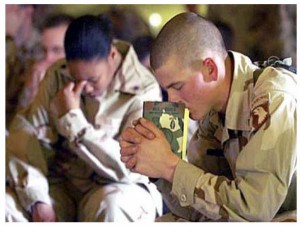
When is it time to seek outside help?
This is pretty easy to answer: You will know if it is time to seek outside help when the behavior of the serviceperson becomes abnormally un-normal. When life becomes a teeter-totter of ups and downs that can’t seem to be controlled no matter how hard you try. When your surroundings and relationships seem unstable and unsafe and you aren’t sure why, get help.
When my husband began experiencing PTSD, neither one of us had a clue what was going on at the time. There was no such thing as Post-Traumatic Stress. War was something that a person went to, came home from and tried to move on. It wasn’t discussed. It wasn’t thought about (or so we once thought and wanted to believe).
No one considered how the events of combat could impact an individual for the rest of his life. If you came home somewhat physically whole, that was a gift. You healed physically, and you lived as if all the horror from battle never happened. The past was the past and it should not impact one’s future. What an absurd assumption.
Now we understand that nothing in our past is ever fully in the past. The good and the difficult follow us wherever we go. We are part of our experiences. With understanding, courage, and information we may gain strength and wisdom to move forward. Getting outside help can guide us in forming the wisdom and understanding needed for healing.
What are some good resources for help with PTSD or TBI?
There are many resources available to our military service men and women. Check with your local Veteran’s Administration Center if you suspect you need support. You may need to be referred to a Veteran Hospital for further testing and diagnosis, especially if you suspect a traumatic brain injury. Every state has several local centers that have been established to help veterans find the appropriate placement and support needed to get the services they may require. (VA Centers are listed in our book)
Don’t stop at NO if you are convinced you have something wrong that necessitates some form of treatment. Sometimes all you need is that one special person who can take your situation seriously enough to get help. Our family personally saw this happen with my brother. He was extremely wary of anyone associated with the government. As a Vietnam vet, his mistrust of a broken, ineffective system made him reluctant to seek help from a military or veteran organization of any kind. Once he decided to seek services he ran into several brick walls. Yet, he kept trying, until he finally found a former army sergeant who took his situation seriously and made things happen.
It only took one person to make a difference. Don’t’ give up or give in to frustration. Keep going. Help is available, but sometimes you may have to fight for it just like you did in battle. If you did it then, you can do it now.
In ending, we want to thank you and your loved ones for your service and sacrifice. You have made a difference that few will understand, or perhaps fully appreciate. Nevertheless, please recognize the depth of your courage, strength and warrior spirit. These are the attributes that sustained you through combat, and now they will do so again in moving you towards healing and a better life.
Jun
24
Healing Waters & Wounded Warriors
Filed Under Healing Waters, Tears of a Warrior, Trauma, Treating PTSD, War | 1 Comment
 by Janet J. Seahorn
by Janet J. Seahorn
How do we mend a wounded body or soul? How do we take a step forward in healing a spirit that has been battered by the trauma of battle? One possibility is to introduce the wounded warrior to a place of cooling waters, a place where fish are abundant and one can float through the waters which hum a soothing lullaby of serenity. Project Healing Waters is a volunteer organization that is dedicated to supporting the mending process of military personnel and veterans who have been impacted by the effects of combat. And it uses waters and fly fishing to achieve its mission.
The idea originated when its founder, Ed Nicholson, a veteran of previous war, was himself being treated at Walter Reed Medical Center in Washington D.C. when he noticed a number of young warriors sitting idly in the waiting room. Ed decided to invite several to go fishing with him. On that first excursion, he discovered how this simple fishing experience made a huge difference both physically and emotionally with the young vets. Where eyes were once vacant, there was now a light of excitement; where physical energy was almost stagnate, a resurgence of vigor returned; and where a life seemed consumed by pain and hopelessness, Mother Nature breathed her message of rebirth and Trust into the mind, heart, body, and soul of the wounded warrior.
Ironically, the Healing Waters Foundation has found that the greatest challenge is getting Wounded Warriors to the program. Recruitment is a huge obstacle, partly because of the physical and emotional needs of the individuals, and partly because of the legal ramifications of the vet centers/hospital treating the individuals. Gosh, I never imagined the number of logistical barriers faced by organizations wanting to help make a difference.
Project Healing Waters tries to work through a VA therapist to identify prospective participants. By having a solid system in place, both the support organization and the VA centers can offer a clearer, more holistic approach to healing. The intervention received by the vet can then be measured and assessed as to what works best and why. This knowledge can then be shared with other VA centers and hospitals across the United States.
Ancient cultures have long understood that wounds of the body and soul need a holistic approach for healing to occur. Medications, cognitive therapies, surgeries simply aren’t enough. Where medications have some difficult side effects, nature offers only blessings. Where daily life often brings disorder, there is an order in nature – a way in which all things seem divinely connected from a single rain drop to a flowering mountain meadow. Where days feel misaligned, nature realigns the soul and spirit, letting us knows that all is as it should be. And where our day- by-day activities may seem bounded by the constraints of “to do lists”, nature chants a song of freedom, encouraging us to spread our wings and soar – even if these wings feel shattered.
So, if you are a disabled vet, knock down the door of your local VA center or hospital and request that your medical personnel get you aligned with a volunteer from Healing Waters. This can also be a breathtaking opportunity for you and your family.
Healing Waters volunteers serve as mentors and companions to our country’s wounded warriors. Their mission is uncomplicated – it is merely about healing and mending minds, bodies, and spirits – one unhurried cast at a time – one soothing river somewhere in America. Casting, Healing. Casting, Healing. Casting, Healing, and the wounds begin to slowly mend.
HEALING WATERS
My soul was battered by combat’s horrors,
So I went to the water to heal.
Wounds covered by flesh with war torn scars,
I went to the water to heal.
My heart was broken unable to feel,
I went to the water to heal.
And the water murmured softly–
Be at peace my precious son
Your soul is safe,
Your battles are done.
My waters shall cool and soothe your weary heart,
You came to me
Your healing can now start.
Not knowing where to turn for comfort or for calm,
I went to the water to heal.
The deafening clatter of ghosts from the past,
I went to the water to heal.
The strain of the city made my sanity reel,
I went to the water to heal.
And the water murmured softly
Sit beside me and be still,
Listen to my tranquil song
Let your soul be filled.
My waters shall comfort your torn and tattered soul.
You came to me
I will purge you of your foes.
For sacred, healing waters
are not new to any man,
They’ve been around a long time
Lapping shores of golden sand.
Silently restoring with their tender, gentle hands
A Life to kinder being
Healing water shall command.
by Janet J. Seahorn
Jun
24
PTSD Series Discussion #4
Filed Under Combat PTSD, Events, Family, PTSD, Tears of a Warrior, War | Comments Off on PTSD Series Discussion #4
by Janet J. Seahorn

How can we talk about PTSD as a family?
Gosh, this is a tricky question with an even trickier answer. As we have discussed in most of the prior questions, the first step is to acknowledge that upon returning from combat things aren’t quite normal. Become informed about the signs and symptoms of PTSD. Be honest as much as you can about what each of you is feeling. As the service person, you don’t have to go into all of the horrible details of your experiences, but you do and will need to discuss the truth that your military life in a combat zone may have been pretty distressing; that what you saw and did was often unsettling.
As the significant other or spouse, your role initially is to just listen. Try not to ask too many questions. Sometimes it may seem you are prying. Try and wait a bit before going into the details. But it is crucial, as a family, to talk. Silence is simply not an option. It creates distance by making assumptions about behaviors that may not be accurate.
In our book, we describe an incident where a young man who had been in several roadside bombings returned home from Iraq. On a quiet Saturday afternoon, the family decided to take a trip out of town to a favorite shopping center. It was to be a fun outing of togetherness. Things were going well until the young family came to bridge where a man waving for help was standing by the roadside next to a car with a flat tire. The wife suggested they stop and help, however, the young serviceperson immediately turned his vehicle around in the middle of the road, angrily stomped on the gas and headed home. Not knowing what was happening, the wife assumed her husband was acting unreasonably. It was a silent ride back to town. The young vet never told his wife what was going on in his mind. Later, during his scheduled visit to his VA counselor he retold the story. He knew his wife and children were upset with him for ruining their fun afternoon. However, what he saw was not an ordinary man with a flat tire needing help. What his mind and body saw and felt was a possible setup for an IED (Improvised Explosive Device). He had seen this many times during his tour of duty in Iraq. He had two thoughts to keep his family out of harms way: 1) He could shoot the “terrorist” standing on the roadside, or 2) He could, without delay, get his family away from the danger zone. Understanding that shooting the “threat” was probably not the best decision, he chose option two. Makes perfect sense, but without talking he went home angry and upset. And his family had no clue as to what had just occurred.
In our book we advise “If you care, you share”. Sharing creates understanding. Understanding generates compassion. And compassion establishes hope and protects the relationship.
Another word of advice about discussing a concern: Never try and sit down to talk over an issue when one or both parties are in a full pitch of rage or anger. You can’t stop a charging bear… it is already on a mission to attack. You must wait until tempers are calmer and conditions settle down enough to have a reasonably calm and “adult” discussion. If a blaming game begins, stop immediately. Blaming never solves the problem; it only throws more fuel on a hot fire. Use “I” statements such as, “I start to feel afraid when I see you getting angry and I don’t understand why?” or “It is hard for me to go to family events without you. I miss doing things together and want to know what I can do to make it OK for you to attend some of our family get-togethers.”
Most of our family conversations, once we began to understand what we were facing, resulted in a compromise that everyone could agree would make the situation better for all involved. We now try not to live on assumptions by doing a reality check with the person. For family events, every person becomes responsible for him or herself. Sometimes my husband chooses downtime away from a houseful of noisy people. He goes to a quiet room to watch TV or read a book while the rest of us play a rowdy game of Pictionary or Shout It Out. This is a Win/Win for everyone and is absolutely acceptable behavior.
Jun
3
Memorial Day in Evanston, WY
Filed Under American Patriotism, Events, Family, Memorial Day, Tears of a Warrior, War | 1 Comment
by Janet J. Seahorn
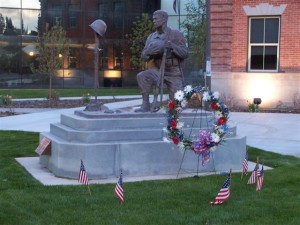
You hear stories about the patriotism of small town USA. The way the community comes together as a single entity to honor its military – those individuals who have served our country. The events always include a bit of flag waving and back patting, “Thank you for your service”. This Memorial Day we had the honor to experience one such town. This is a town, Evanston, Wyoming, which far exceeded any story or past city we have visited.
It was early Sunday evening when we arrived in Evanston. Tony was asked to be the guest speaker at their annual Memorial Day event. We had just returned the day before from Europe. Both of us were more than a bit jet lagged, and I was secretly wishing I was sleeping in my comfy bed back home and wondering what the heck we were thinking when we first accepted the speaking engagement.

As we drove through the streets around town, we noticed flags flying from bridges, street corners, store shops, and of course homes. More flags than we have ever seen. The cemetery was filled with flags and brightly colored flower arrangements. A motorcycle bike rally made the atmosphere even more charged.
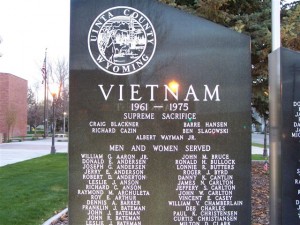
Then we passed a truly humbling sight, the town’s monuments set right in the center of the Court House and Civic Center. Monuments that went way back to the Civil War. The most interesting two tributes were to the Korean and Vietnam conflicts. These were modeled after the Vietnam Wall in Washington D.C. What made them unique, however, was the black granite slabs held the names of every resident of the county who served in the war zone, not just the names of those who had died. The words carved into one stature said it well, “All gave some; some gave all”. Wow! We have never seen a town where every military person was acknowledged. You could trace the heritage of the community’s military generations from WW I forward. Many families had at least four or more last names engraved on each monument. So much sacrifice for a household to bear.

As we listened to the Memorial Day speeches, watched the presentation of flags honoring all military branches, including a flag for the POWs and the MIAs, heard the hallowed sounds of the bagpiper bellowing Amazing Grace, and viewed the solemn and appreciative faces of the people, it was a “lump in the throat” experience. Yes siree, Evanston, Wyoming is truly one of America’s most patriotic towns. It was obvious that such gratitude is a daily way of life, not merely a one day event. They live the words, God Bless America, and God Bless those who serve her mission of freedom and liberty for all.

Thank you for sharing your patriotic spirit with us and showing the world that honor, integrity, and flag waving are not political statements, but a way to demonstrate respect for the sacrifice given by the few, so that the many can live in a land of abundance and independence.
May
25
PTSD Series Discussion #3
Filed Under Combat PTSD, PTSD, PTSD treatment, Tears of a Warrior, Treating PTSD, War | Comments Off on PTSD Series Discussion #3
 Question 4: If I, as a serviceperson, have PTSD, how can I help myself?
Question 4: If I, as a serviceperson, have PTSD, how can I help myself?
First, be honest with yourself. As stated in the last question, do not ignore the signs that you are suffering from serving in combat. Do not pretend that things are fine; that the problem lies with everyone around you such as your spouse, children, neighbors, family, or co-workers. Watch for signs such as increased anger, irritability, depression, and/or isolation from normal family events. Resisting the feelings associated with PTSD only exacerbates the problem. The best thing you can do if you think something is not normal is to visit your Veteran’s Center as soon as possible. These centers have become much more proficient in serving the military population’s needs than they were during past conflicts. Physicians and therapists now recognize and understand in better detail the effects of PTSD and how to treat it. Don’t wait. Help is available. The sooner you get assistance, the sooner your life will begin to move forward in a manner that allows you to live more fully. You deserve to be at peace, to be happy and so does your family. You and your loved ones have given enough in serving your country. Now it is time that your country does something for you. Help is waiting; don’t wait another minute to get it. Life is too precious to be wasted fighting demons from the past. Today is the only thing you have that will make a difference for tomorrow. So use today wisely to gain understanding, healing, and perhaps some peace of mind and spirit.
Other suggestions include spending time outdoors. Nature offers us a tremendous healing environment, especially for emotional wounds. We find hiking, fishing, skiing, and simply just being in the wilderness soothes much of our anxieties and internal tensions. Pets are also a therapeutic comfort. A great deal of research has been conducted that has shown the positive impact animals have on a person’s well being. Because our pets love us unconditionally, are non-judgmental, and provide a sense of safety and security, they are one of the very best options for keeping us sane and healthier both physically and emotionally. A few additional suggestions that we have found quite beneficial are meditation, aroma therapy (no kidding J), body massage, and heavy doses of laughter. Humor is a terrific medication since it is almost impossible to be angry and laughing at the same time. It releases endorphins that alleviate body pain, and provides a huge dose of oxygen to the brain and muscles.
Question 5: What can I, as a family member, do to help someone with PTSD or a TBI?
There can be a major difference between a person suffering from PTSD and someone who has incurred a TBI (traumatic brain injury). A TBI is a physical injury to the brain, where PTSD is more a reordering of the neuro networks in the brain. Many times a person with a TBI may also have some form of PTSD, mainly because he/she was in a situation that caused physical and emotional damage to the individual and/or others in the company. As with all illness and trauma, the more informed you become the better you are at making appropriate decisions in handling the circumstances. Illness and problems must first begin with immediate recognition that something is not quite right. The sooner you recognize the signs of PTSD, the sooner you can begin the healing process. Once again, it is dangerous to ignore the obvious and pretend things will get better with time. Too often, this does not happen by itself. Time can make behaviors and tensions more precarious, destroying personal relationships and family cohesion. No one benefits by waiting. Spouses get tired of walking through the “mindfields” of the traumatized serviceperson. Children suffer because they can’t and don’t’ understand why mommy or daddy are not always the same kind; loving parents they were before war.
When a family member returns from combat with PTSD, everyone close to him must join together to offer support, hope, and comfort. In doing so, however, you must set suitable boundaries that will keep the family safe and well-balanced. If children are involved, they must be at the forefront of your concern. Their physical and emotional well-being is of utmost important. Living with a parent who has untreated PTSD can have long-term, negative consequences on a developing child. Getting immediate treatment for your spouse and yourself will be the best line of defense in moving towards the life you want to live and the family unit you want to be.
May
18
PTSD Series Discussion #2
Filed Under Combat PTSD, PTSD, PTSD treatment, Tears of a Warrior, War | 1 Comment
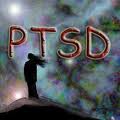 Question: 2: Is PTSD different from Combat Stress?
Question: 2: Is PTSD different from Combat Stress?
The answer to this question may depend on which study you might read or which doctor is doing the diagnosis. Combat Stress has often been referred to as PTSD. “During the Civil War they called it Irritable Heart. During World War I and II it was referred to as Soldier’s Heart or Shell Shock and other terms described it as Neurosis, Combat Fatigue, or Combat Exhaustion (pp. 66-67, Tears of a Warrior, 2010). Every war has coined a term that seemed to describe a warrior who returned from combat with behaviors and reactions that were not a part of his/her life before the battles. Whatever one might prefer to call the behavior is not important. What is important is if the behavior interferes with the person’s ability to live a normal, happy life or the behavior negatively impacts family, friends, or work, you should get help immediately. Today, PTSD is the accepted medical term for similar symptoms from all wars.
Question 3: If my serviceperson has PTSD, will it better?
Our belief is that those suffering from PTSD can and will get better. Some fortunate few whose trauma is not as intense may be able to heal on their own. Most, however, who have seen too much, done too much, lost too much, may only move towards healing with the outside support of a trained physician or therapist. For many, like my husband, there has been no such thing as a full cure. Nevertheless, appropriate medication, counseling, and self-meditation have been a tremendous help in getting to that “better” place. With “better” understanding of what the person is facing and how those closest to him/her can offer appropriate support, the family can become a safer, stronger and more caring unit. Pretending that nothing is happening or that in some miraculous way tomorrow you will awake and all the bad stuff will be gone, is simply not realistic. It doesn’t just go away, no matter how hard you try. In fact, trying harder often makes the situation worse. The best approach to addressing these ongoing painful ghosts is information, productive action, and the courage to admit something is not quite right. Obtaining the help and treatment needed to move towards better physical and emotional health is the best step to recovery.
May
13
PTSD Series Discussion #1
Filed Under Combat PTSD, PTSD, PTSD treatment, TBI & PTSD, Tears of a Warrior, Treating PTSD, War | Comments Off on PTSD Series Discussion #1
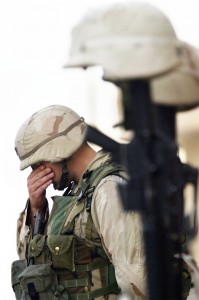 Several weeks ago we were ask to respond to a set of questions regarding Post-Traumatic Stress and combat vets. These responses will be used in a short pamphlet/flip book that will be distributed through another organization. We thought many of our readers might find the questions and our feedback useful. Today’s blog is the first of our five part series. (Part 1 of 5)
Several weeks ago we were ask to respond to a set of questions regarding Post-Traumatic Stress and combat vets. These responses will be used in a short pamphlet/flip book that will be distributed through another organization. We thought many of our readers might find the questions and our feedback useful. Today’s blog is the first of our five part series. (Part 1 of 5)
•1. How do I know if my serviceperson might be suffering from PTSD? (Symptoms, possibly)
This is a great question with a not so simple answer. Not every person who returns from serving in a war zone ends up with Post-Traumatic Stress. A great deal depends on the amount of time the person spent serving under combat conditions, as well as how many traumatic events occurred during his/her deployment. Most doctors and researchers agree that the more time spent away form home, and the more distressing events experienced during each deployment, the greater the likelihood the person may experience some form of PTSD. If the individual was already predisposed to stressful home or environmental factors before joining the military, PTSD may become even more prevalent. There is no simple formula for why one person develops PTSD while others seem OK. But one thing is certain; it has nothing to do with a lack of strength, courage, or character. Sometimes it is simply the hazard of war due to exposure to unspeakable traumatic events, often in life and death situations.
So what signs might you look for when suspecting someone has PTSD? Since the brain is restructured by every act it experiences, it is sensitive to many good and not so good events. Love, hate, prejudice, kindness, and violence are just a few life experiences. Yet, when the life-threatening events occur over and over again for a long duration of time, or even during one incredibly horrifying event, the mind/brain is seared with the image and emotional feelings become imprinted.
Signs/Characteristics of PTSD:
- ð Hyperarousal and abnormal startle responses
- ð Irritability and/or jumpiness; constantly on guard
- ð Hypervigilance
- ð Nightmares, insomnia, and night sweats
- ð Recurrent traumatic memories or flashbacks
- ð Overwhelming waves of emotions
- ð Survivor guilt
- ð Feeling detached and/or emotionally withdrawn from others
- ð Fragmented sense of self and identity
- ð Panic attacks
- ð Shame
- ð Despair
- ð Lethargic or lack of motivation/interest in life, work, and family
- ð Avoidance of common places, activities
- ð Memory and concentration problems
- ð Sadness and hopelessness about the future
The key here is that a person generally does not have ALL of these symptoms at once. Some come more often than others. One person may have numerous panic attacks, while another may want to isolate himself and not take part in normal daily and family activities. It is the severity and frequency of the symptoms that would suggest a diagnosis of Post-Traumatic Stress.
Apr
14
Here Today and Sometimes Still Here Tomorrow
Filed Under Combat PTSD, PTSD, Tears of a Warrior, Today's War, War | 1 Comment
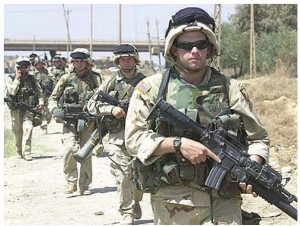
PTSD continues to be everywhere in the news, on TV, and in the movies. The question I have is “Who is listening to all of these stories? Who is concerned about the growing number of new cases resulting from multiple tours of duty in our current wars? Are those in Washington who must attend to severe budget concerns able to do what is necessary? What is right? Is the average American informed enough to care?” Following is information from just one of many data sources on PTSD. It comes from Noel Brinkerhoff (Monday, April 12, 2010), and the information is disturbing.
Nearly 300,000 American troops have served three, four or more times in Iraq and/or Afghanistan, while cases of post-traumatic stress disorder (PTSD) have risen dramatically since the wars began. The possible correlation between these two facts has led to the question of whether it’s fair to send young men and women back into combat again and again, and risk causing long-term mental and emotional problems, not to mention the physical toll.
One U.S. Army study from 2009 found troops in Afghanistan were more vulnerable to developing psychological problems as the number of tours went up (31% for three tours, more than double the rate of those with just one). Another study focused on Iraq showed nearly 15% of Army troops who served two tours suffered from depression, anxiety or traumatic stress; more than double that of a single tour. The PTSD rate was almost 2.5 times higher for two deployments compared with one.
“We just don’t know whether it’s combat exposure, repeated separation from the family or (not enough) time off,” Lieutenant Colonel Paul Bliese, director of the division of psychiatry and neuroscience at the Walter Reed Army Institute of Research, told the Associated Press. “All of those are reasonable explanations.”
Whatever the reason, the ultimate result is that more troops returning home are bringing back with them a whole host of demons and ghosts. These unwanted visitors may never leave the veteran and have significant impact on families, children, and communities. Let us hope that people who can make war decisions are listening, creating effective support services, and making the process as uncomplicated as possible. Let us hope that Americans are willing to provide the physical and mental health funding needed to restore those suffering from combat wounds.
For many families and veterans, the process of getting help becomes so overwhelming difficult that they feel victimized by the very system that should be offering them hope and healing. And let us hope that every politician and every member of our society takes seriously our motto:
If we send them, then we must mend them.

